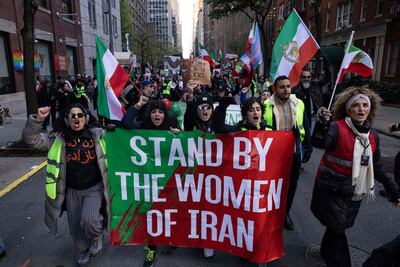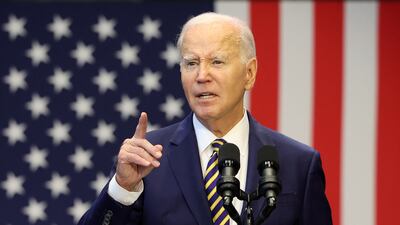President Joe Biden on Friday announced that the US is placing additional sanctions on human rights abusers in Tehran, as he marked the anniversary of Mahsa Amini's death in Iranian police custody which led to protests across Iran.
More than 500 people have been killed in demonstrations since Ms Amini, 22, died on September 16, 2022, days after being detained in Tehran by morality police for wearing her hijab “inappropriately”.
Women and girls have played a key role in the protests, which brought out demonstrators in both urban and rural areas.
The sanctions take aim at 29 people and groups, including key members of Iran's national police and the Islamic Revolutionary Guard Corps, as well as regime-controlled media outlets Fars News, Tasnim News and Press TV, the US Treasury Department said.
The UK and the EU also announced new sanctions against Tehran.
“We are announcing additional sanctions targeting some of Iran’s most egregious human rights abusers,” Mr Biden said.
“Today – as we remember Mahsa’s tragic death – we reaffirm our commitment to the courageous people of Iran who are carrying on her mission. They are inspiring the world with their resilience and resolve. And together with our allies and partners, we stand with them.”
London said its sanctions target senior Iranian decision makers enforcing Tehran's mandatory hijab law, including Iran's Minister for Culture and Islamic Guidance, his deputy, the Mayor of Tehran and an Iranian police spokesman.
Among those with sanctions imposed against them by the EU was the deputy to the commander-in-chief of the IRGC in Imam Ali Central Security Headquarters, west of Tehran.
“Mahsa’s story did not end with her brutal death. She inspired a historic movement – Woman, Life, Freedom – that has impacted Iran and influenced people across the globe who are tirelessly advocating for gender equality and respect for their human rights,” Mr Biden said.

The President pointed to US efforts to support the protests, including by helping demonstrators circumvent Iran's strict censorship and its suppression of internet access.
He said that at the height of the protests, 30 million Iranians – nearly one in three – were using US-supported anti-censorship tools.
The Treasury placed sanctions on Alireza Abedinejad, chief executive of Douran Software Technologies, a leading company in Iran that the US says is assisting the government in censorship and filtering the internet.
“In addition to long-standing media censorship, Iranian authorities have responded to protests with widespread internet shutdowns, throttling connection speeds, and increasing the use of internet filtering, such as blocking websites and Virtual Private Networks to limit communication and the sharing of information,” the Treasury said.
Three media outlets had sanctions imposed because they “work in tandem with Iranian security and intelligence services”, the department added, noting that Press TV had broadcast forced confessions from activists before their trials.
US sanctions generally prohibit Americans from engaging in transactions with those targeted.
“Iranians alone will determine the fate of their country, but the United States remains committed to standing with them – including providing tools to support Iranians’ ability to advocate for their own future,” Mr Biden said.
Iranian authorities said Ms Amini died from a heart attack but her family disputed that, leading to protests that spread across the country and around the world.
In a video message, Secretary of State Antony Blinken said the US would “continue to take appropriate actions against those who suppress Iranians’ basic human rights”.
The US has already placed sanctions on more than 70 Iranian people and entities “responsible for supporting the regime’s oppression of its people”, Mr Biden said.
The sanctions come after the US and Iran reached a deal to release five detained US citizens in exchange for the unfreezing of $6 billion in Iranian funds that are supposed to be used for humanitarian purposes.















